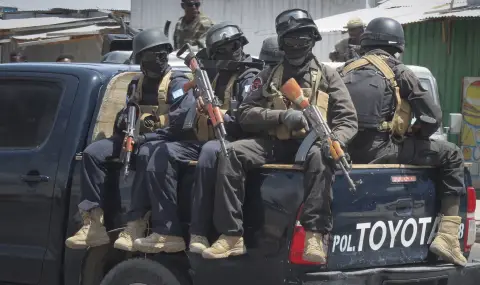Turkey's strategic attempts to expand its influence in Africa have recently led to new projects in Somalia, where Ankara wants to explore offshore oil fields and plans to improve military cooperation with a new missile test site. Since launching its Africa Initiative policy in 1998, Turkey has aimed to strengthen trade, diplomatic and security-related ties with the black continent.
The Turkish government is investing “a lot of energy and ambition“ in achieving its economic goals within the policy framework, says Volkan Ipek of the private Yeditepe University in Istanbul, adding that the strategy is aimed at boosting trade and promoting free trade agreements with these countries.
A growing market
Over the past two decades, Turkey has increased the number of its embassies in Africa from 12 in 2002 to 44 in 2022. Turkish Airlines now serves routes to 62 African destinations, and 38 African countries have opened embassies in Ankara.
Turkey's growing influence on the continent is reflected in its growing trade volumes, which rose from 4.85 billion euros in 2003 to over $41 billion in 2022, before falling to $37 billion last year. What Turkish investors find most attractive is Africa's young population and the growing demand for goods that promise big economic benefits. But Turkey's initiatives must compete with projects launched by China, Russia and the Arab states of the Persian Gulf region, which are also seeking to increase their influence in Africa.
Volkan Ipek believes that Africa is becoming a “big market“, as its growing economies “argue so much interest that Turkey inevitably feels obliged to participate in this race“.
A gateway to new energy markets
In July, Turkish Energy Minister Alparslan Bayraktar signed with Somalia the so-called hydrocarbon exploration and production agreement, which grants Ankara exclusive rights to explore for and produce oil and gas in three blocks off the Somali coast.
Sohbet Karbuz, director of the hydrocarbons and energy security department at the Paris-based think tank “Mediterranean Observatory for Energy and Climate“, sees the exploration partnership as a “strategic step“ to secure Turkey's energy supplies. The country is dependent on raw material imports - 74% of its energy needs are met from abroad - which is why Ankara is seeking to diversify its energy sector. The country currently still imports huge amounts of pipeline gas from Russia, Azerbaijan, Algeria and Iran and buys liquefied natural gas from the US, Egypt, Russia, France and Nigeria.
Unfulfilled goals and weak partners
As ambitious as Turkey’s Africa strategy may seem, the country has consistently failed to achieve its annual trade volume target of 50 billion euros. This is what trade was supposed to reach in 2012 – four years after the African Union declared Turkey a “strategic partner”. In 2021, President Erdogan even increased the volume to 75 billion euros. dollars, without specifying a timeframe for achieving this new goal.
Ufuk Tepebaş of the Center for African Studies at the University of Basel says that setting goals is one thing, but it is more important to "determine the potential of the countries and diversify trade partners."
So far, Turkey has signed free trade agreements with only four African countries - Tunisia, Egypt, Morocco and Mauritius. Somalia and Sudan still receive the majority of Turkish development aid, and bilateral cooperation is mainly focused on Turkey's close religious and historical ties with the two countries. That is why Tepebaş calls on Ankara to "analyze properly" when choosing its African trade partners. "The potential of Somalia and Sudan in terms of trade is very weak. "If they had chosen to support Ethiopia, Tanzania and Kenya, they would probably have received a higher trade return," Tepebaş said.
Security vs. Investment Projects
Turkey is also establishing itself as a key security partner for several African countries. According to data published by the Swedish Peace Research Institute SIPRI, Turkey has become the fourth largest arms supplier to sub-Saharan Africa, thanks to sales of attack helicopters to Nigeria and training aircraft, as well as Bayraktar drones to several African countries.
In addition to selling weapons to Africa, Turkey has also begun large-scale civilian investments there. According to Trade Minister Ömer Bolat, a total of 1,864 projects have been completed in the past few decades, with Turkish investments totaling $85.4 billion. However, Turkish companies are struggling to compete with Chinese firms, especially in securing the necessary financing for large projects, Tepebaş said.
By 2023 alone, Chinese investments in Africa will total $282 billion. By comparison, Turkey’s investments so far have been around $10 billion. Volkan İpek believes that Turkey’s engagement in Africa lags behind Russia’s politically and China’s economically.
Author: Bilen Seda Sezer
